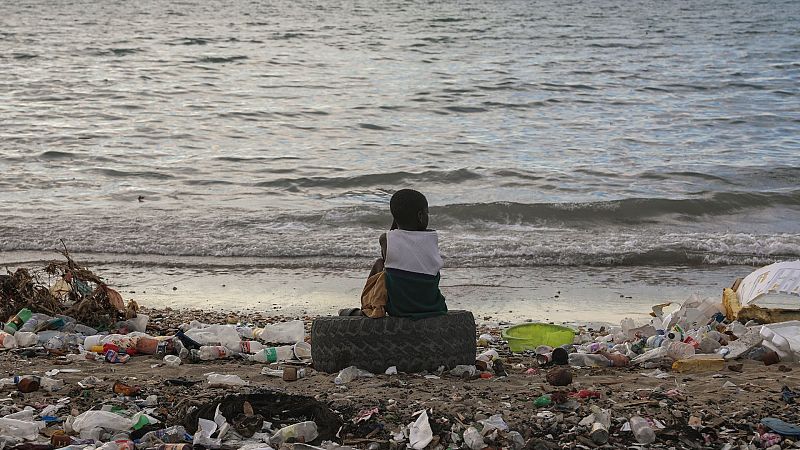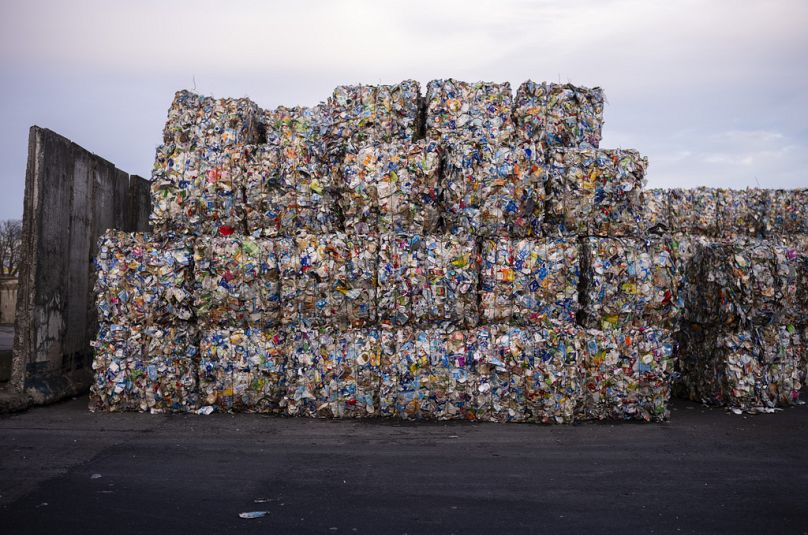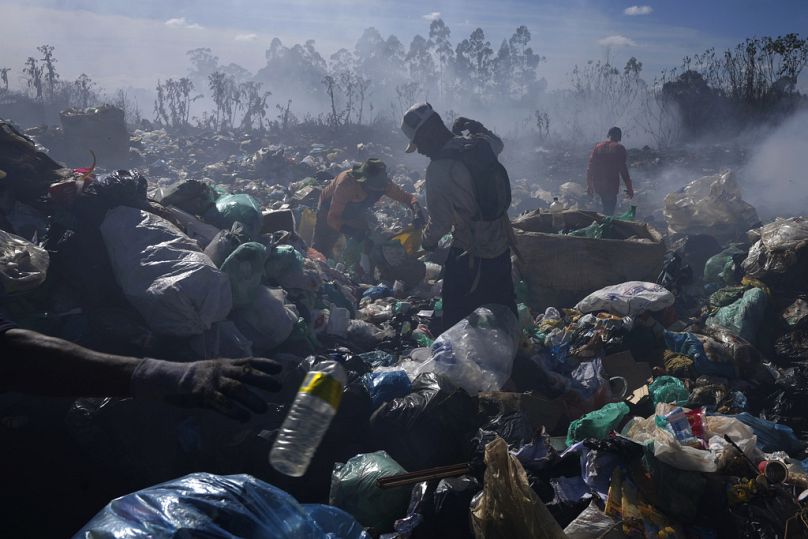As countries meet to agree a landmark plastics treaty, is recycling or producing less the answer?

In Busan, South Korea countries are trying to negotiate a landmark treaty to reduce plastic pollution.
It is now entering the final stretch of talks before the treaty becomes legally binding - two years after the decision was first made to address the problem.
But there are still several sticking points when it comes to the best way to tackle plastic pollution and this is hampering progress on an agreement. One of the most contentious is whether there should be a limit on how much plastic companies can produce.
Plastic recycling: Where do the divisions lie?
On one side there are countries and groups, including the EU, which believe introducing measures to cut plastic production should be an essential part of an ambitious treaty.
On the other are oil and plastic-producing countries and companies that believe the pollution problem starts with waste. Those like Saudi Arabia, Iran, and Russia say waste management should be the answer and have voiced opposition to a cap on plastic production.
At first glance, this seems like a reasonable approach. Surely improving efforts to recycle plastics will help with pollution?
While most plastics are in theory recyclable, only a small amount actually are due to the complexity of the process. Different types - like polyvinyl chloride (PVC), polypropylene (PP) and polyethylene (PE) - can’t be recycled together. Separating them is a time-consuming and costly process. Items made of multiple materials often can’t be separated. Most plastics can only be recycled one or two times before they degrade.
As a result, less than 10 per cent of the 400 million tonnes of plastic produced each year is recycled, according to the United Nations Environment Programme.
The plastic industry is backing alternative methods like chemical recycling but there is little evidence to suggest this can be done on the scale needed to be a viable solution.
“In a world where experts predict the tripling of plastics production by 2050, increasing collection and recycling by even 50 per cent would not solve the problem of pollution at all,” France’s Minister for the Energy Transition, Agnès Pannier-Runacher, told French media earlier this week.
Would curbing plastic production work?
The need for production to be curbed is a position backed by research too. A study published in the journal Science just before the talks in Busan began found that production must be cut to tackle the global plastic pollution problem.
It says the amount of mismanaged waste - that which isn’t burned, recycled or ends up in landfill and instead leaches out into the environment - will double to 121 million tonnes by 2050 without limits placed on production.
By continuing with a business-as-usual approach, the world would generate enough waste between 2010 and 2050 to cover Manhattan with a pile of plastic 10 times the height of the Empire State Building.
Researchers suggested four key measures needed to address the problem: requiring new products to be made from at least 40 per cent recycled, investing $50 billion (€47.4 billion) in expanding infrastructure for waste management, implementing a levy on plastic packaging and capping new production at 2020 levels.
While each of these measures plays some role in tackling the problem, they say without a cap on production the other elements would need to be incredibly ambitious to succeed. No one measure is the ‘silver bullet’.
It isn’t just about the plastic which leaches into the environment either. Over their entire lifecycle, plastic produced worldwide causes almost three times the greenhouse gas emissions of aviation. Around 90 per cent of these emissions come from the process of extracting fossil fuels and turning them into plastics.
The study found that without some restrictions on the creation of new plastics, emissions from the plastic system would increase by 37 per cent by 2050. That’s the same as almost 9,000 natural gas-fired power stations operating for one year.
What could a cap on production do to tackle the waste problem?
More than 50 countries and the EU have signed the Bridge to Busan commitment which means they want to see the issue tackled with measures through the entire lifecycle of plastic - that includes ensuring sustainable production.
"From the side of the European Union, we have to tackle the full lifecycle of plastics if we want real results," Anikó Raisz, Hungary's Minister of State for Environment and Circular Economy and EU Presidency representative at the talks, said on Friday.
She said that the EU strongly supports having text in the agreement that tackles waste management but also focuses on the upstream issue of production.
"The reasons are simple. If you look at how we've progressed in the last few decades, it's visible that humanity has already tried to tackle this challenge. We've developed a lot of technologies in the meantime but we haven't been yet able to reach a 100 per cent recycling rate for plastics".
"If we don't handle the question of production and the reduction of production, you're never going to be able to really handle the problem of plastics," Raisz added.
Non-profits including Greenpeace, the World Wildlife Fund and Break Free From Plastic delivered a petition with three million signatures to government officials on the day before discussions began, asking for them to “drastically reduce” the production of plastic.
If production was capped at the level it was in 2020 - a year when the COVID-19 pandemic meant the world was making an incredible amount of plastic - mismanaged waste would fall from 121 million to 72 million tonnes by 2050.
Slow progress sparks fears of a weak treaty
At the midway point in the talks on Wednesday, progress on finding a compromise has been slow.
Colombia, the EU, Fiji, Iraq, Norway and Switzerland all expressed their disappointment at what they called ‘delay tactics’ from some countries. Iran, Russia and Saudi Arabia reinstated their calls for a decision based on consensus.
Some fear a repeat of the recent COP29 climate summit in Baku. There, slow progress throughout the two-week talks led to an underwhelming final deal, delivered hours late, which no one appears to be happy with.
UNEP executive director Inger Andersen appeared to put on the pressure on Wednesday. She told the press gathered in Busan that a final treaty should “absolutely” deal with both consumption and production of plastic - but Andersen added that this was up to countries to negotiate.
Yesterday



